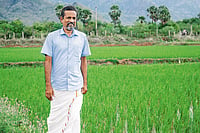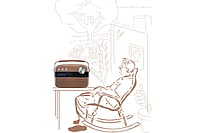“Every day, for a month, we were burning 200 bodies of Corona victims in Surat,” says Abdul Rehman Malbari, President of Surat’s Ekta Trust, a not-for-profit organisation for cremating and burying unclaimed and abandoned bodies.
Burning the dead is something that Malbari has been doing since the past 30 years after he founded Ekta Trust in 1994. But never did he feel its eeriness as strongly as during the months when the second wave of the pandemic ravaged through India. “There was a time when I used to think that the world is coming to an end. Helpless families, overburdened doctors, scavengers like black marketers and the mounting dead — it was mayhem all around,” says Malbari, a Muslim undertaker, who was the key man behind giving the COVID victims in Surat a dignified closure — irrespective of their religion. While he buried the Christians and Muslims at the respective graveyards, he cremated the Hindus at the allotted crematoriums.
“We were getting close to 200-250 bodies a day but there was no space to cremate them,” says 52-year-old Malbari, for whom having a full meal in a day became impossible as his phone kept ringing will calls for cremation. “There was no time to think. We just kept working. I didn’t go home for almost a month.”
Surat has four cremation grounds with about 20 gas furnaces, and all of them were running to full capacity, yet they weren’t enough. Bodies piled up in cold rooms. The furnaces kept burning day and night. “One day one of the chimneys of a furnace gave away because of the excess heat generated due to constant burning,” he recalls.
As the bodies piled up, Malbari had to take special permission from the civic authorities to cremate them on wooden pyres. He and his 120-member team zeroed on five places, including an old unused crematorium that had to be bulldozed overnight, to cremate COVID victims. They requested the nearby villages for wood and made 100 pyres divided into 25 zones.
“This continued for at least a month. But this gave us an opportunity to clean the gas furnaces. We then started using the gas furnaces for 12 hours during the day and the wood pyres at night,” he said.
Malbari was working on multiple fronts: at the crematorium, assisting families of those dying in their homes, explaining them the protocols, and helping them get death certificates. “The hardest part was to deal with families who couldn’t say goodbye,” he says.

At a time when most people were cocooned in the safety of their homes, Malbari and his team were out in the open braving the virus. Finding time to eat was also a luxury — they often had to ask people for food or for someone to pay for it. For days and weeks, they barely slept. And, they couldn’t go back home fearing that they would pass on the virus to their families. “My office is close to my house but I couldn’t go there even to take bath mostly because the neighbours would have had problems,” he says. That wasn’t for no reason. 70 members of Malbari’s team got affected by COVID at various points in time, but later recovered. So, Malbari built a makeshift washroom outside his office for his team to use.
But what pains Malbari most is seeing people die who weren’t supposed to. “Many died because of lack of treatment, panic and duplicate drugs. Black marketing of Remdesivir — a possible life-saver as popularised by the medical fraternity — was a major reason for mass deaths during the second wave,” he says. The undertaker believes that somehow the medical fraternity was fighting the COVID battle alone. “A doctor can attend up to 25 patients in a day; during COVID that number swarmed to 75. There was no way they could give proper treatment to all.”
While on one end there were the likes of Malbari, who were working round the clock in a haze for the society, on the other end there were some hospitals, which were trying to cash in on the distress. “Despite pleas by doctors, the management of some hospitals kept squeezing in patients in the ICU — even using tables as beds. They ruthlessly demanded deposits from families and also had a price card for Corona patients,” recalls a distraught Malbari. “This hasn’t happened in a day. It takes time for people to lose their conscience and character. If everyone does their bit and duty, there’s no reason a disease like Corona causing mayhem,” he says.
But being surrounded by the dead hasn’t made him cynical. In fact, Malbari thrives on optimism and strongly believes that the virus isn’t deadly enough to take lives — unless we allow it to. “There was a lot of negative word-of-mouth and misguiding that happened about the virus during the first wave. It’s the panic that caused more deaths. I have been infected twice by the virus but I survived, because of my willpower and pineapples (chuckles).”
How did he find support for this kind of work from his family considering his has been into textiles for years? “Initially, there was resistance but when people started appreciating our work, my family, too, gave in.” Malbari started Ekta Trust after reading about the unclaimed body of a Muslim woman way back in 1994. Her son had fled from the hospital after learning about her being diagnosed with HIV — a big stigma back then. He then contacted the only organisation in Surat that was burying unclaimed bodies, but they told him the man who did the job was on leave. Malbari, then 21, along with a friend learnt the procedure to handle dead bodies and buried Haseena Ben with full dignity.
His organisation has 3,000 members and Malbari and his team are even called by other states in case of any disaster or natural calamity.
“I just want to continue to do this till my last breath. It’s something that gives me peace,” Malbari says.































